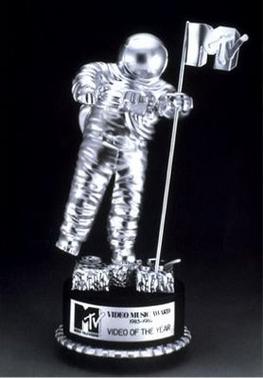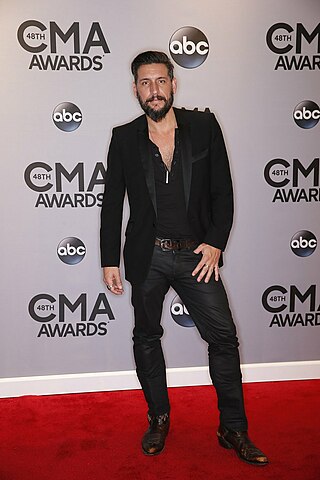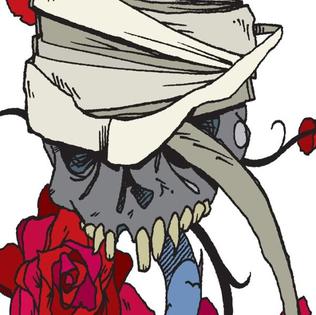
The MTV Video Music Awards is an award show presented by the cable channel MTV to honor the best in the music video medium. Originally conceived as an alternative to the Grammy Awards, the annual MTV Video Music Awards ceremony has often been called the "Super Bowl for youth", an acknowledgment of the VMA ceremony's ability to draw millions of youth from teens to 20-somethings each year. By 2001, the VMA had become a coveted award.
The MTV Video Music Award for Video of the Year is the most prestigious competitive award and the final award presented at the annual MTV Video Music Awards. The award was created by the U.S. network MTV to honor artists with the best music videos. At the first MTV Video Music Awards ceremony in 1984, the Video of the Year honor was presented to The Cars for the video "You Might Think". Originally, all winners were determined by a special panel of music video directors, producers, and record company executives. Since the 2006 awards, winners of major categories are determined by viewers' votes through MTV's website, while the jury decides in the technical categories.
The MTV Video Music Award for Best New Artist has been given out since the first annual MTV Video Music Awards in 1984. Until 2006, the award was named Best New Artist in a Video. In 2007 its name was changed to Best New Artist, as the category underwent a format change to recognize the artist's body of work for the full year rather than a specific video. For the 2008 ceremony, the award retained its 2007 name but returned to the format of awarding a specific video rather than the artist's full body of work.
The MTV Video Music Award for Best Direction is an award given to the artist, the artist's manager, and the director of the music video. From 1984 to 2006, the full name of the award was Best Direction in a Video, and in 2007, it was briefly renamed Best Director. The category acquired its current name with the 2008 awards.
The MTV Video Music Award for Best Visual Effects is a craft award given to the artist, the artist's manager, and the visual effects artists and/or visual effects company of the music video. From 1984 to 2006, the award's full name was Best Special Effects in a Video, and after a brief removal in 2007, its name was shortened to Best Special Effects between 2008 and 2011. In 2012, the category acquired its current name.
The MTV Video Music Award for Best Art Direction is a craft award given to both the artist as well as the art director of the music video. From 1984 to 2006, the award's full name was Best Art Direction in a Video, and after a brief removal in 2007, its name was shortened to its current form starting in 2008. The biggest winners are K. K. Barrett and Jan Houllevigue, both of whom won this award twice.
The MTV Video Music Award for Best Editing is a craft award given to the artist, the artist's manager, and the editor of the music video. From 1984 to 2007, the award's full name was Best Editing in a Video, before acquiring its current name in 2008.
The MTV Video Music Award for Best R&B was first awarded in 1993 under the name Best R&B Video, and it was given every year until 2006. The following year MTV revamped the VMAs and eliminated all the genre categories. However, in 2008, when MTV returned the Video Music Awards to their previous format, Best R&B Video did not return despite four other genre awards doing so. It was only in 2019 that the R&B award returned to the VMAs, now under the shorter name of Best R&B.
The MTV Video Music Award for Best Hip Hop was first given out at the 1999 MTV Video Music Awards. The award, according to MTV, was originally intended for hip hop-inspired songs, not necessarily actual hip hop music videos. This explains the recognition of non-hip hop songs such as "Thong Song" and "I'm Real (Remix)".
The MTV Video Music Award for Best Rock was first given out in 1989, one of the four original genre categories added to the VMAs that year. In its first year, the award was called Best Heavy Metal Video, and from 1990 to 1995, it was renamed Best Metal/Hard Rock Video. The category underwent a third, brief name change in 1996, when it was renamed Best Hard Rock Video. In 1997, the award acquired its most enduring name, Best Rock Video, which it retained until 2016. The following year, the word "Video" was removed from all genre categories at the VMAs, giving this award its current name: Best Rock.
The MTV Video Music Award for Best Pop was first given out in 1999 under the name of Best Pop Video, as MTV began to put several teen pop acts in heavy rotation. Nominations, however, were not just limited to pop acts, as dance, R&B, pop/rock, and reggaeton artists have also received nominations throughout the award's history.

Shane C. Drake is an American music video director and producer originally from Redding, California. He has directed videos for many artists, including Kelly Clarkson, Carrie Underwood, Avril Lavigne, Trivium, Paramore, Fall Out Boy, Panic! at the Disco, Angels & Airwaves, Flo Rida, Timbaland, Blindside, The Red Jumpsuit Apparatus, The Almost, Hawthorne Heights, Subseven, and AJR. He is best known for Panic! At the Disco: I Write Sins Not Tragedies (2006), Tim McGraw & Taylor Swift: Highway Don't Care (2013) and Paramore: Misery Business (2007).
The MTV Video Music Award for Best Video Game Score was only given out in 2006 as a complement to the Best Video Game Soundtrack award. With the 2007 revamp of the VMAs, this award was eliminated and never brought back.

The 2005 MTV Video Music Awards aired live on August 28, 2005, honoring the best music videos from the previous year. The show was hosted by Diddy at the American Airlines Arena in Miami, Florida. The big winner of the night was Green Day, who took home seven VMA's, including Best Rock Video, Best Group Video, Viewer's Choice, and Video of the Year.

The 2004 MTV Video Music Awards aired live on August 29, 2004, honoring the best music videos from the previous year. The show took place at the American Airlines Arena in Miami, Florida, and, unlike in previous years, had no host.

The 1987 MTV Video Music Awards aired live on September 11, 1987, from the Universal Amphitheatre in Los Angeles. Hosted by MTV VJs Downtown Julie Brown, Carolyne Heldman, Kevin Seal, Michael Tomioka, and Dweezil Zappa, the show honored the best music videos released from May 2, 1986, to May 1, 1987.

The 1988 MTV Video Music Awards aired live on September 7, 1988, from the Universal Amphitheatre in Los Angeles. Hosted by Arsenio Hall, the show honored the best music videos released between May 2, 1987 and April 1, 1988.
The MTV Video Music Award for Best Collaboration was first introduced to the MTV Video Music Awards in 2007 under the name Most Earthshattering Collaboration, as the VMAs were revamped and a few new categories were added to the show. When MTV brought the VMAs back to their old format in 2008, this category did not return. It was not until 2010 that the category was reintroduced under the name Best Collaboration.
The MTV Video Music Award for Video for Good is an award handed out at the yearly MTV Video Music Awards, first introduced at the 2011 ceremony. Originally named Best Video with a Message, the word "Social" was added to its name in 2013.

MTV VMA Score 2005 is a two-part soundtrack album for the 2005 MTV Video Music Awards. The score was written and produced by Mike Shinoda and Lil Jon. An EP was released on August 31, 2005, in support of the award function. The soundtrack was available for download on the website of MTV during 2005–2006, but the whole album was not available anywhere, so Shinoda released it separately for streaming on his official website on March 1, 2010.






